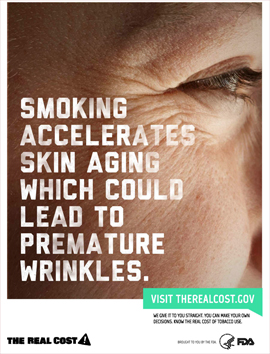FDA launching campaign to stop youth from becoming life-long smokers
The Food and Drug Administration will start their first tobacco prevention campaign targeted at adolescents.
“The Real Cost” addresses the more than 10 million 12 to 17-year-olds who have already began smoking or may pick up the habit soon and are in danger of becoming life-long addicts, the FDA said in a statement on Monday. Advertisements will start running across the country on Feb. 11.
“The campaign, an unprecedented effort for the federal government, uses evidence-based best practices proven to reduce youth tobacco use. Visually compelling and personally relevant ads to educate youth about the harms,” the FDA said in a statement.
One in five deaths in the U.S. can be attributed to cigarette smoking, according to the Centers for Disease Control and Prevention. It causes about 90 percent and 80 percent of male and female lung cancer deaths, respectively. Men are 23 times more likely to develop lung cancer if they smoke, and women increase their risk 13 times when they start the habit.
In addition,
cigarette smoking causes nine out of 10 deaths from chronic obstructive
pulmonary disease (COPD).
Smoking cigarettes also increases coronary heart disease and stroke risk two to four times. The habit makes blood vessels thicken and narrow, which in turn makes the heart beat faster and blood pressure to increase. Clots can also form and block blood flow, causing a heart attack or a stroke.
Adolescents are an important group to target because smokers
usually start using cigarettes in their youth. The CDC said that 88 percent of
adult daily smokers started buying cigarettes before they were 18 years old. Every day, almost
4,000 kids under the age of 18 smoke their first cigarette. An additional 1,000
adolescents make the move to become daily smokers.
“Our kids are the replacement customers,” Mitch Zeller, director of the FDA’s Center for Tobacco Products, told the Washington Post.
Government statistics reveal that in 2013, about 14.8 percent of eighth graders admitted they had smoked a cigarette at one point of their life. Already, 1.8 percent were daily smokers.
In the older groups, tobacco consumption increased greatly. About 38.1 percent of 12th graders surveyed said they had smoked a cigarette at one point, and 8.5 percent were daily smokers.
The CDC warned that e-cigarettes, as well as hookahs and cigars, were increasing in use among the age group.
"We need effective action to protect our kids from addiction to
nicotine," Dr. Tom Frieden, director of the CDC, said in an agency press release.
